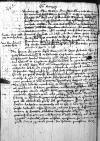List #3082
Ioannes DANTISCUS & Achatius von ZEHMEN (CEMA) do Johann von LUSIAN (LUZJAŃSKI)s.l., [1547-04-06 — 1547-04-26]
Regest polski:
Nadawcy w imieniu swoim i pozostałych członków rady Prus Królewskich przytaczają in extenso zlecenie rozpatrzenia sprawy wystawione przez króla [Zygmunta I]. [Tekst poruczenia pominięty w kopii listu]. Po przedstawieniu owego poruczenia zostali wezwani przez radę miasta Grudziądza do wystawienia pozwu w sprawie w nim wspomnianej, zgodnie z jego brzmieniem.
Ponieważ pragną wykonać polecenie królewskie i wypełnić treść poruczenia, na mocy władzy udzielonej im przez króla pozywają adresata i wzywają go do stawienia się na najbliższym sejmie Prus Królewskich przed radcami tej ziemi, niezależnie od miejsca i terminu jego zwołania. Ma on stawić się osobiście lub przysłać pełnomocnika w pełni upoważnionego do reprezentowania go w sprawie opisanej w królewskim poruczeniu. Nadawcy zastrzegają, że niezależnie od tego, czy pozwany się stawi, czy nie, sprawa będzie procedowana zgodnie z brzmieniem poruczenia.
Rękopiśmienne podstawy źródłowe:
Pomocnicze podstawy źródłowe:
| ||||||
Tekst + aparat krytyczny + komentarz Zwykły tekst Tekst + komentarz Tekst + aparat krytyczny
Nos
Commissionem serenissimae
Post cuius commissionis praesentationem fuimus pro parte providi
Nos igitur volentes mandatum et commissionem regiam, ut tenemur, ad exsecutionem debitam perducere, auctoritate eiusdem

 AAWO, AB, D. 70, f. 264v
AAWO, AB, D. 70, f. 264v